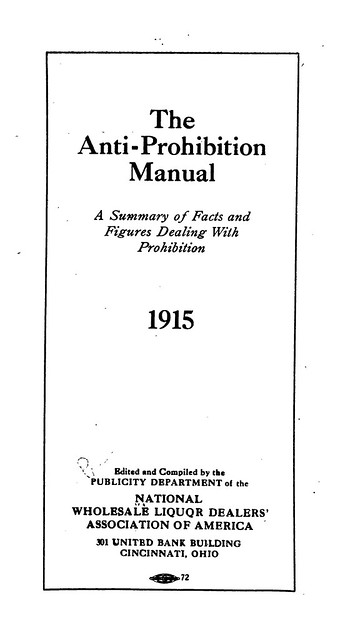Our religion is based on freedom of choice. It is for us to decide choices bad or good, according to our definition of the same. Men and women cannot be legislated into Goodness nor into Salvation.— The National Wholesale Liquor Dealers' Association of America
If we lose control of ourselves, the mind and body run riot. Self-control, combined with temperance in the individual, is the basis of society's moral success. Prohibition begins at the wrong end.
The Prohibitionist believes — “Law, then public sentiment”— whether or so. This is far from the idea of those who fought for us in 1776.
Cincinnati, Ohio: 1915.
Despite their efforts, the National Wholesale Liquor Dealers' Association of America would prevail against neither "Goodness nor Salvation." National Prohibition, the 18th Amendment to the United States Constitution, was passed on 16 January 1919, and took effect a year and a day later, on 17 January 1920.
Decreeing alcolic beverages to be illegal nationwide*, the 18th Amendment has the ignominious distinction of being the only Constitutional amendment, among all twenty-seven approved, to deny rights rather than granting them.
Section 1. After one year from the ratification of this article the manufacture, sale, or transportation of intoxicating liquors within, the importation thereof into, or the exportation thereof from the United States and all the territory subject to the jurisdiction thereof for beverage purposes is hereby prohibited.Amendment XVIII
Section 2. The Congress and the several States shall have concurrent power to enforce this article by appropriate legislation.
Section 3. This article shall be inoperative unless it shall have been ratified as an amendment to the Constitution by the legislatures of the several States, as provided in the Constitution, within seven years from the date of the submission hereof to the States by the Congress.
United States Constitution
National Archives
Prohibition would remain in effect for thirteen years, not repealed until 5 December 1933, with the passage of the superseding 21st Amendment.
How dry I am, how dry I am.
It's plain to see just why I am.
No alcohol in my highball
And that is why so dry I am.
Then have some Bevo.
Have a drink of Bevo.
It's the grandest imitation that we know.
If you care for beer, it's the drink you should pick.
It tastes like lager but it hasn't got the kick.
Bevo, have a drink of Bevo,
Though it hasn't got a punch up, it's sleeve-o.
How dry I am, how dry I am.
It's plain to see just why I am.
Oh, how I call for alcohol.
And that is why so dry I am.
-----more-----
- * Note that the 18th Amendment did not explicitly forbid the possession or consumption of alcoholic beverages (only their manufacture, distribution, and sale). Furthermore, it did not define what "intoxicating liquors" were, leaving that up to Congress. On 28 October 1919, Congress did just that, overriding the veto of President Woodrow Wilson to pass the Volstead Act into law, which defined "intoxicating" as over 0.5% alcohol-by-volume (abv). — Okrent, Daniel. "Last Call: The Rise and Fall of Prohibition," Scribners, 2010.
- For more from YFGF:
- Follow on Twitter: @Cizauskas.
- Like on Facebook: YoursForGoodFermentables.
- Follow on Flickr: Cizauskas.
- Follow on Instagram: @tcizauskas.










No comments:
Post a Comment
Comment here ...